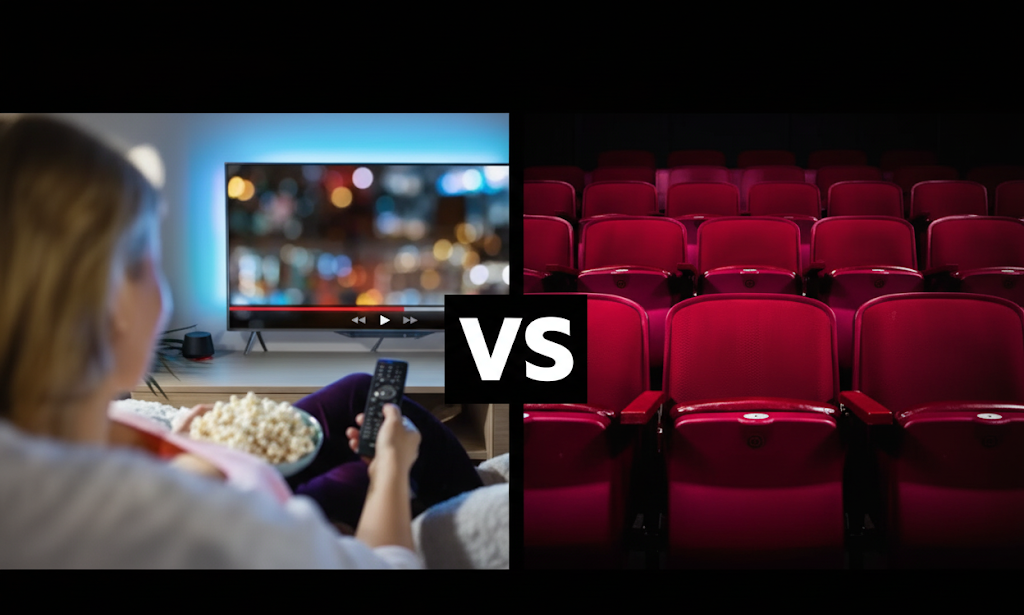There’s a ritual to it. You scroll through your usual sites, scan the titles, and just for a moment it feels like sitting in that dark theater just before the lights dim, quietly hoping something new will grab you. Maybe this will be the year a story knocks the wind out of you.
But then the list starts to blur. Reboots. Prequels. Sequels. “Reimaginings.” All too familiar names in fresh makeup. That spark flickers, replaced by the kind of sigh you give when you knew better but hoped anyway.
And yet, once in a blue moon (almost like clockwork) one of those familiar titles hits just right. For a couple of hours you’re pulled back into that seat, heart thumping like it used to. Those rare moments keep you coming back, scrolling again, chasing that cinematic high.
Meanwhile, film keeps polishing the past, serving out just enough of the familiar to reel us back in, while streaming quietly builds the next era of entertainment.
Movies: Stuck in a Time Loop
Walking into a theater these days rarely feels like stepping into the new and unknown. More often, it feels like déjà vu. Another hero. Another villain with a redemptive arc. Another remake. Another “prequel to the prequel” explaining a side character’s backstory nobody remembered, and nobody asked for anyway.
This isn’t cynicism, it’s strategy. Studios have gotten cautious. The cowboy days are over. In a digital world where nothing stays hidden, criticism is instant, and cancel culture looms, gambling hundreds of millions on something “original” sounds less like innovation and more like a financial panic attack. So, they keep polishing the familiar, wrapping it in pretty packaging to distract us. Nostalgia gets run through the machine again and again until it’s market-tested and franchise-ready.
And sure, there are exceptions (there always are) but the heartbeat of original cinema has shifted. Discovery has been replaced by maintenance.
Streaming: Where the Weird Thrives
Streaming, on the other hand, has become a refuge for the strange and the bold. Series don’t have to conquer the box office in two weekends to survive. They can sprawl. They can unravel slowly or sprint ahead, experiment with structure, and dive into niches that would never make it past a studio boardroom.
Take The Bear. A story about a struggling Chicago sandwich shop mirrored by the struggling family behind it. It’s raw, chaotic, and uncomfortably intimate. Sharp dialogue, overlapping voices, quiet emotional collapses in the walk-ins. My husband, a former chef, loves how accurately it nails the industry’s rhythm. It’s messy and human in ways that would be smoothed over by studio notes. Each episode is a sustained panic attack laced with grief and love, finding beauty in the breakdown. Streaming gave it the space to breathe, simmer, and build, something films rarely gamble on anymore.
Then there’s The Last of Us. It could have been a run-of-the-mill zombie movie, but instead it leaned hard into grief, found family, and gray morality. The series stretched its story across a deliberate narrative that let moments land. Whole episodes focused on character bonds and human quiet between the chaos. It wasn’t chasing zombie spectacle so much as it was telling a story about survival and humanity in a broken world. Streaming gave it that room to let bouts of silence speak volumes, tension build slowly, and keep its soul intact instead of trimming it to fit runtimes.
And then we get to The Boys. How do you describe it? It treats the superhero genre like a Catholic school girl who stumbled onto a Girls Gone Wild set, rips away the innocent façade, cranks up the chaos, and smiles like it’s been waiting for this fall from grace. It’s deliciously satirical, viciously gory, and unapologetically political. It takes aims at celebrity and blind hero worship and corporatization. And the best part of it all: no one is safe from its crosshairs. Streaming gave The Boys permission to be outrageous, uncomfortable, and raw. It pushed boundaries in tone and subject matter, proving you can take familiar material and do something entirely new when you’re not shackled to box-office formulas. Sure, it started as a comic book series, but the show cranks it to eleven, leaning harder, cutting deeper, and turning subtle jabs into cannonballs to the gut.
The Great Role Reversal
It’s funny, isn’t it? TV used to be the safe medium, formulaic sitcoms, predictable procedurals. Movies were the frontier. Now it’s flipped. TV is the playground. Film has become the brand shelf.
Why It Matters
Don’t bury film just yet. This isn’t a eulogy; it’s an acknowledgment of a shift already in motion. Movies are busy rewriting the past; streaming is writing the future. One is preserving. The other is exploring.
And honestly? I still miss walking into a theater not knowing the ride I was in for. I miss the anticipation, the adrenaline rush, and then latent high; the kind that leaves your brain buzzing because you just saw something you didn’t even know you wanted. These days, that feeling doesn’t come from the big screen. It usually hits me halfway through a series I almost didn’t click “play” on.


Leave a Reply